
Edward Meyrick was an English schoolmaster and amateur entomologist. He was an expert on microlepidoptera and some consider him one of the founders of modern microlepidoptera systematics.

Pyraustinae is a large subfamily of the lepidopteran family Crambidae, the crambid snout moths. It currently includes about 1,280 species Most of them tropical but some found in temperate regions including both North America and Europe.
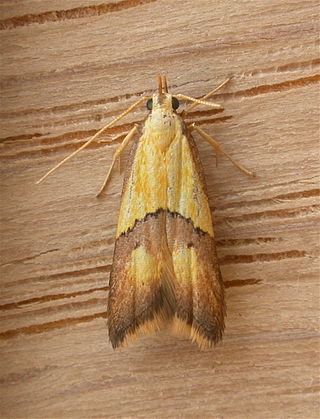
The Lecithoceridae, or long-horned moths, are a family of small moths described by Simon Le Marchand in 1947. Although lecithocerids are found throughout the world, the great majority are found in the Indomalayan realm and the southern part of the Palaearctic realm.

The Archipini are a tribe of tortrix moths. Since many genera of these are not yet assigned to tribes, the genus list presented here is provisional.

Crambinae is a large subfamily of the lepidopteran family Crambidae, the crambid snout moths. It currently includes over 1,800 species worldwide. The larvae are root feeders or stem borers, mostly on grasses. A few species are pests of sod grasses, maize, sugar cane, rice, and other Poaceae. The monophyly of this group is supported by the structure of the tympanal organs and the phallus attached medially to the juxta, as well as genetic analyses.

Dichomeris is a genus of moths in the family Gelechiidae erected by Jacob Hübner in 1818.
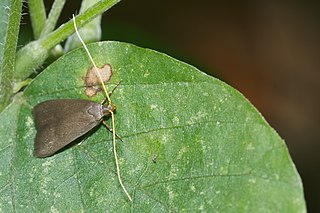
The Lecithocerinae are a subfamily of small moths in the family Lecithoceridae. They are found worldwide, but most species occur in South Asia. The subfamily is characterized by the male genitalia with a bridge-like structure connecting the tegumen and the valva, and the uncus almost always is vestigial with two lobes at the dorsal base, only exceptionally united into a broad plate, but never as a thorn or spine.

Lecithocera is a genus of moths in the lecithocerid subfamily Lecithocerinae. The genus was erected by Gottlieb August Wilhelm Herrich-Schäffer in 1853.
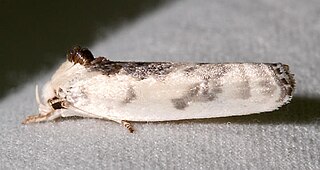
Antaeotricha is a genus of moths. It is the largest genus in the subfamily Stenomatinae, numbering over 400 species in the Western Hemisphere.

Acrocercops is a genus of moths in the family Gracillariidae.

Dichomeridinae is a subfamily of moths in the family Gelechiidae.

Xyloryctidae is a family of moths contained within the superfamily Gelechioidea described by Edward Meyrick in 1890. Most genera are found in the Indo-Australian region. While many of these moths are tiny, some members of the family grow to a wingspan of up to 66 mm, making them giants among the micromoths.
Atasthalistis pyrocosma is a moth in the family Gelechiidae. It was described by Edward Meyrick in 1886. It is found on New Guinea and Australia, where it has been recorded from Queensland.
Atasthalistis tricolor is a moth in the family Gelechiidae. It was described by Cajetan Felder, Rudolf Felder and Alois Friedrich Rogenhofer in 1875. It is found in Indonesia, the Solomon Islands and Australia, where it has been recorded from the Northern Territory.
Atasthalistis ochreoviridella is a moth in the family Gelechiidae. It was described by Pagenstecher in 1900. It is found in Queensland, the Bismarck Archipelago, the Philippines (Mindanao), New Guinea and the Dampier Archipelago.
Atasthalistis hieropla is a moth in the family Gelechiidae. It was described by Edward Meyrick in 1919. It is found in Fiji.
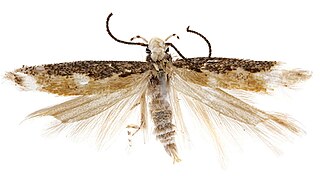
Gelechiinae is a subfamily of moths in the family Gelechiidae. It was described by Henry Tibbats Stainton in 1854.

Anacampsinae is a subfamily of moths in the family Gelechiidae.
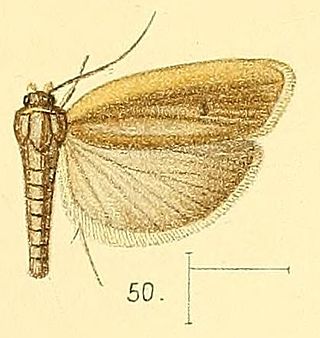
Stenoma is a genus of moths. The type species is Stenoma litura, which was described by Philipp Christoph Zeller in 1839.














